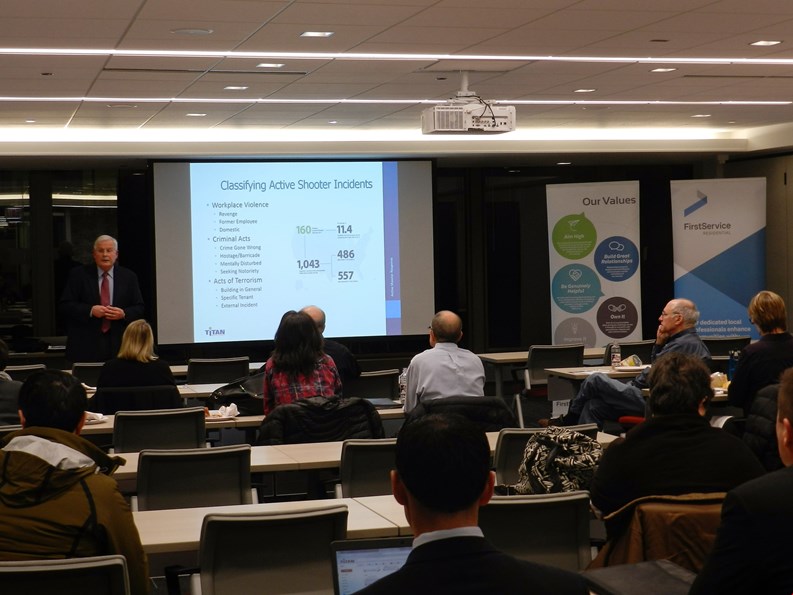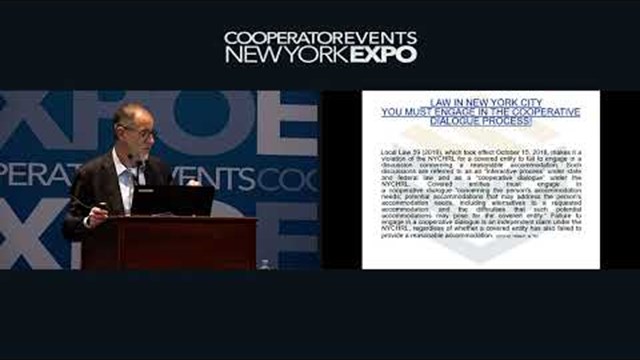So far in 2016, as of February 5, exactly 1,187 people have been killed by guns in the United States. Of those deaths, 287 were children under the age of 17. In the first 10 days of the 2016 over 100 people had been shot in the city of Chicago alone. So on January 27, FirstService Residential held an active shooter seminar for their employees, property managers and the tenants in the buildings they manage.
“In society today we see more and more of these active shooter situations, some on larger scales than others. We felt it was our duty to put on a training program that would be valuable for our clients, managers, and engineering maintenance staff,” says Asa Sherwood, president of FirstService Residential Illinois, “It had been brought up a bit before Paris and San Bernadino, but those attacks had pushed this to the forefront and we decided to do it now.”
While the first of these seminars from FirstService had been held in Chicago, there are plans to roll it out to the rest of their markets across the country.
“When this came up and we started talking about it, once we started working with [Bill Leap, vice president of security services at Titan Security], we started talking to the other markets we work in and we will be rolling this training out in other markets,” says Sherwood.
Tragedy Hits Home
Shootings in condos, co-ops, and HOAs haven’t made national headlines, but they have occurred in recent years. In 2012, an HOA president in Kentucky had been shot and killed over an ongoing argument with the board over the height and design of the alleged shooter’s fence. In 2004, in Chicago, a resident had been evicted from his condo due to rule violations which included the installation of parquet floors, allowing transient tenants, and failing to pay the condo’s assessments and fees. He shot the condo board president and another resident.
“Residential buildings are not the biggest targets for active shooters, but now that terrorism has taken the turn and we have far more mixed-use buildings it’s starting to change the scenario a little bit,” says Leap. “Only about 4.4 percent, a number from a recent FBI study, of active shooter situations occur in residential environments.”
Since the beginning of the year there have been 12 mass shootings—defined as four or more people shot and/or killed in a single incident—reported across the United States, according to the Gun Violence Archive, a non-profit organization that tracks gun violence across the country.
“What’s happened with active shooters over the last couple of years, at least since the shoe bombing episode, is that a lot of acts of terrorism and crime have started to look like they are active shooter scenarios. Active shooter scenarios are not just the result of workplace violence and disgruntled employees and can spill over into a lot of different environments,” says Leap.
Despite many active shooters situations not taking place in residential buildings, Leap advises that people should still know what they need to do should they find themselves in such a situation.
“The first thing to do is understand what your options are. You want to fall back on this run, hide, fight option. Which option to choose will depend on the situation, if you can get out of the building you should do so as possible. In a residential setting, knowing where you can hide may just be your best option,” says Leap.
Run, hide, fight is a directive from the U.S. Department of Homeland Security that explains what someone should do if they find themselves in an active shooter situation. They note that if you are able to run you should have an escape route and plan in mind, leave your belongings behind and keep your hands visible. If you’re going to hide it should be out of the shooter’s view, your phone should be silenced and the entry to your hiding place should be blocked and the doors locked. Fighting should be a last resort and only if your life is in imminent danger.
“It’s not necessarily a 1-2-3 thing. In a high-rise environment it would be more of a hide, run, fight; it would be similar in a residential situation,” says Leap.
Leap notes that if you find yourself by an exit and are able to take it you should do so given the chance. It is important to note that police will enter the building quickly in an active shooter situation in an attempt to take down the shooter, a change made after the Columbine school shooting, so if you are attempting to escape the area your hands should be in the air and you should listen to directives given by responding officers.
John Zurz is a staff writer for The Cooperator.







Leave a Comment